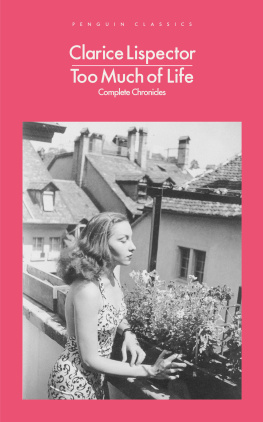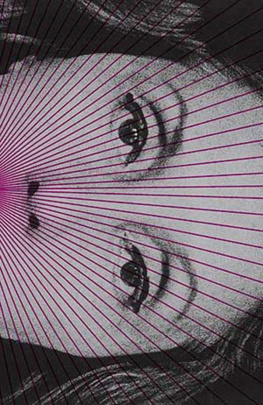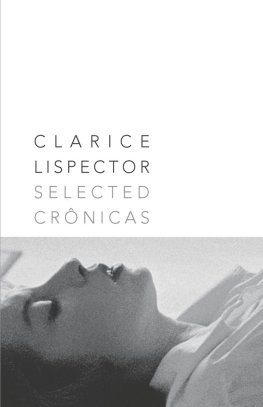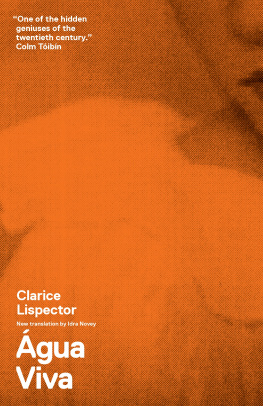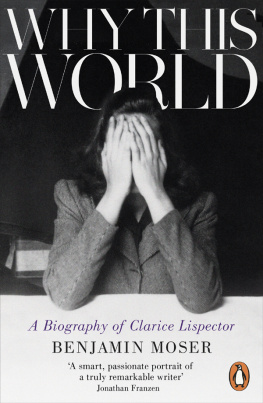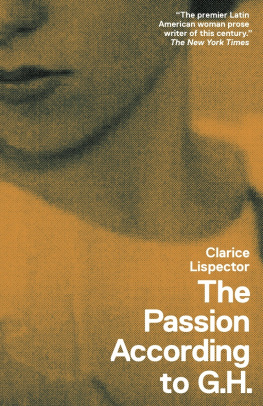Clarice Lispector - The Stream Of Life
Here you can read online Clarice Lispector - The Stream Of Life full text of the book (entire story) in english for free. Download pdf and epub, get meaning, cover and reviews about this ebook. year: 1989, publisher: University of Minnesota Press, genre: Science fiction. Description of the work, (preface) as well as reviews are available. Best literature library LitArk.com created for fans of good reading and offers a wide selection of genres:
Romance novel
Science fiction
Adventure
Detective
Science
History
Home and family
Prose
Art
Politics
Computer
Non-fiction
Religion
Business
Children
Humor
Choose a favorite category and find really read worthwhile books. Enjoy immersion in the world of imagination, feel the emotions of the characters or learn something new for yourself, make an fascinating discovery.

- Book:The Stream Of Life
- Author:
- Publisher:University of Minnesota Press
- Genre:
- Year:1989
- Rating:4 / 5
- Favourites:Add to favourites
- Your mark:
- 80
- 1
- 2
- 3
- 4
- 5
The Stream Of Life: summary, description and annotation
We offer to read an annotation, description, summary or preface (depends on what the author of the book "The Stream Of Life" wrote himself). If you haven't found the necessary information about the book — write in the comments, we will try to find it.
The Stream Of Life — read online for free the complete book (whole text) full work
Below is the text of the book, divided by pages. System saving the place of the last page read, allows you to conveniently read the book "The Stream Of Life" online for free, without having to search again every time where you left off. Put a bookmark, and you can go to the page where you finished reading at any time.
Font size:
Interval:
Bookmark:

Clarice Lispector
The
STREAM
of
Life
It's with such intense joy. It's such an hallelujah. "Hallelujah," I shout, an hallelujah that fuses with the darkest human howl of the pain of separation but is a shout of diabolical happiness. Because nobody holds me back anymore. I still have the ability to reasonI've studied mathematics, which is the madness of reasonbut now I want plasma, I want to feed directly from the placenta. I'm a little frightened, still afraid to give myself over since the next instant is the unknown. Do I make the coming instant? Or does it make itself? We make it together with our breathing. And with the ease of a bullfighter in the ring.
Let me tell you... I'm trying to capture the fourth dimension of the now-instant, which is so fleeting it no longer is because it has already become a new now-instant, which also is no longer. Each thing has an instant in which it is. I want to take possession of the thing's is. Those instants that elapse in the air I breathe: in fireworks exploding silently in space. I want to possess the atoms of time. And I want to capture the present which, by its very nature, is forbidden me: the present flees from me, the moment escapes me, the present is myself forever in the now. Only in the act of loveby the clear, starlike abstraction of what one feelsdo we capture the unknown quality of the instant, which is hard and crystalline and vibrant in the air, and life is that incalculable instant, greater than the event itself: in love, the instant, an impersonal jewel, glitters in the air, a strange bodily glory, matter sensitized by the shiver of secondsand what one feels is at the same time immaterial and so objective that it happens as if it were outside the body, sparkling on high, happiness, happiness is the matter of time and the instant par excellence. And in the instant resides its own is. I want to capture my is. And I sing an hallelujah to the air, just as a bird does. And my song is no one's. But there's no passion suffered in pain and in love that's not followed by an hallelujah.
Is my theme the instant? my life theme. I try to keep up with it, I divide myself thousands of times, into as many times as the seconds that pass, fragmentary as I am and precarious the momentsI pledge myself only to a life that is born with time and grows with it: only in time is there space for me.
I write you completely whole and I feel a pleasure in being and my pleasure of you is abstract, like the instant. And it's with my entire body that I paint my pictures and on the canvas fix the incorporealme, body-to-body with myself. One doesn't understand music, one hears it. Hear me, then, with your whole body. When you come to read me you'll ask why I don't stick to painting and exhibiting my pictures, since my writing is coarse and orderless. It's just that now I feel the need for wordsand what I write is new to me because my true word has remained untouched until now. The word is my fourth dimension.
Today I finished the canvas I told you about: round lines that penetrate each other in thin, black strokes, and you, who are in the habit of wanting to know whyand because it doesn't interest me, the cause is matter of the past you'll ask why the thin, black strokes? It's because of the same secret that makes me write this now as if to you, for what I write is round, complicated, and tepid, but sometimes frigid like fresh instants, stream water trembling always on its own. Can what I've painted on this canvas be phrased in words? Just as much as the mute word can be implicit in musical sound.
I see that I've never told you how I listen to music I rest my hand lightly on the turntable and my hand vibrates, spreading waves through my whole body: that's how I hear the electricity of the vibration, the ultimate substratum in the domain of reality, and the world trembles in my hands.
And so I realize that I want for myself the vibrant substratum of the word repeated in a Gregorian chant. I'm aware that everything I know I cannot say, I know only by painting or pronouncing syllables blind of meaning. And if here I have to use words for you, they must create an almost exclusively bodily meaning. I'm battling with the ultimate vibration. To tell you my substratum I make a sentence of words composed only of the now-instants. Read, then, my invention of pure vibration, without meaning except that of each bubbling syllable, read now what follows: "With the flow of the centuries I have lost the secret of Egypt, as I moved in longitude, latitude, and altitude with the energetic action of electrons, protons, neutrons, in the fascination which is the word and its shadow." What I just wrote you is an electronic design and has no past or future: it is simply now.
I also have to write you because your domain is that of discursive words and not the directness of my painting. I know that my sentences are primary, I write with too much love for them and this love fills in their gaps, but too much love harms a work. This isn't a book because this isn't how one writes. Is what I write a single climax? My days are a single climax: I live on the edge.
When I write I can't create as I do in painting, when, as an artisan, I create a color. But I'm trying to write you with my whole body, shooting an arrow that firmly pierces the tender nerve ends of the word. My incognito body tells you: "Dinosaurus, icthiosaurus, and plesiosaurus," words with a merely auditory sense, without turning into dry straw but staying moist. I don't paint ideas, I paint the more intangible "forever." Or "for never," it's the same. Above all else, I paint painting. And above all else I write you hard writing. I want to discover how I can grasp the word with my hand. Is the word an object? And as instants pass, I take the juice from their fruit. I have to disown myself to reach the kernel and seed of life. The instant is the live seed.
The secret harmony of disharmony: I don't want what is already made but what is tortuously in the making. My unbalanced words are the luxury of my silence. I write in acrobatic, aerial pirouettesI write because I passionately want to speak. Even though writing is only giving me the great measure of silence.
And if I say "I," it's because I don't dare say "you," or "we," or "a person." I'm limited to the humble act of self- personalization through reducing myself, but I am the "you-are."
Yes, I want the last word, which is also so first that its already confused with the intangible part of the real. I'm still afraid to depart from logic because I fall into the instinctive and the direct, and into the future: the invention of today is my only way of establishing the future. From now on is future, and any hour is an appointed hour. Anyway, what harm is there in my departing from logic? I'm dealing with primal matter. I'm after what's behind thought. It's useless to try to classify me: I simply slip away not leaving, categories pin me down no longer. I'm in a very new and true state, one curious about itself, so attractive and personal that it defies my ability either to paint it or write it. It's like certain moments I had with you, when I loved you, moments beyond which I could never go since I plumbed the depths of moments. It's a state of contact with the surrounding energy, and I tremble. A kind of crazy, crazy harmony. I know that my look must be the look of a primitive person who surrenders completely to the world, primitive like the gods who only broadly accept good and evil and aren't interested in the good that's wound into evil like into hair, the evil that is the good.
I capture sudden instants that bring their own death with them and others are bornI capture the instants of metamorphosis, and their sequence and concomitance have a terrible beauty.
Next pageFont size:
Interval:
Bookmark:
Similar books «The Stream Of Life»
Look at similar books to The Stream Of Life. We have selected literature similar in name and meaning in the hope of providing readers with more options to find new, interesting, not yet read works.
Discussion, reviews of the book The Stream Of Life and just readers' own opinions. Leave your comments, write what you think about the work, its meaning or the main characters. Specify what exactly you liked and what you didn't like, and why you think so.

